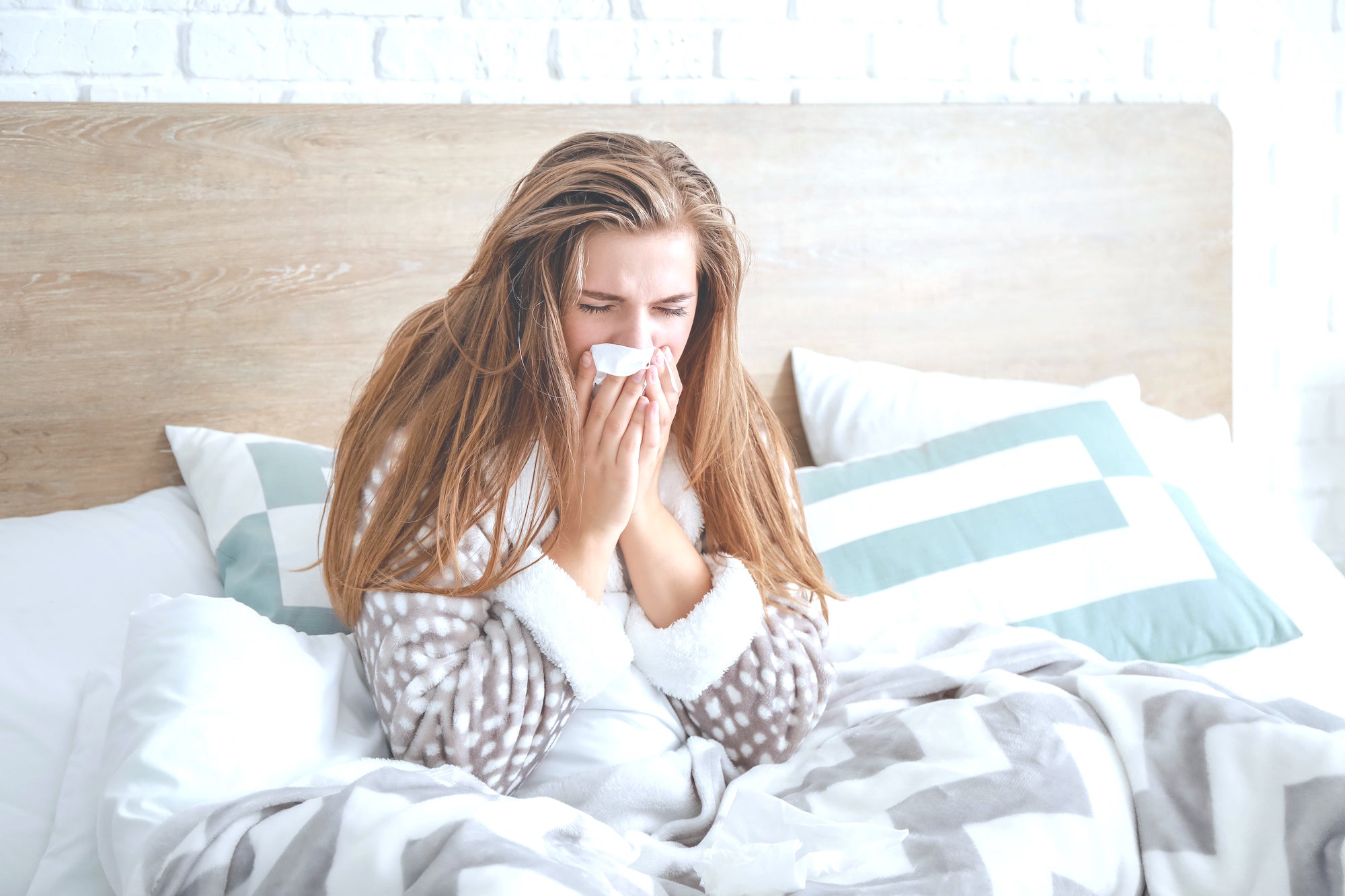
7 Easy Tips to Strengthen Your Immune System
We try to take care of ourselves, we do. We use cavity-fighting toothpaste and pick heart-healthy Cheerios. We’ve stopped buying skincare with parabens and sulfates because we want products that are good for our skin.
It’s easy to remember these parts of our body, just by looking in the mirror or feeling our heart flutter wildly at a photo of Chris Hemsworth. But how often do you remember to take care of less obvious concerns like your immune system?
Maintaining a healthy immune system is vital to warding off illnesses and needs the same care and consideration that you give the rest of your body.
If you’ve been slacking off where your health is concerned, try following these easy tips to give your immune system a fighting chance!
1. Keep Your Hygiene On Point
Whenever flu season rolls around again, you suddenly can’t go ten seconds without some article reminding you to wash your hands. They’re right, though — washing your hands can help prevent the spread of germs!
Unwashed hands deposit germs on surfaces in all sorts of ways: through cooking, during a hug or handshake, or when you touch your face for the eighteenth time that day. Think your hands can't be that dirty? Wrong.
(Have you ever seen the results from that bread experiment? UGH. Just...UGH.)
Hand-washing has another indirect benefit. Avoiding that first, minor illness may save you down the road! By dodging infection number one, you also dodge the possibility of immediately contracting a secondary infection, which can often be more serious than the first.
Plus, a lot of illnesses and infections are overprescribed with antibiotics. These high-powered medications aren't always necessary, and overuse can lead to antibiotic resistance.
That antibiotic killed your first cold? No kidding. But the next illness you catch has already adapted, and won’t be so easy to shake. If only you hadn’t caught that first cold to begin with!
By now, you may be running around your house with the Lysol wipes. But be sure you aren’t always turning to hand sanitizer instead of good old soap and water! While hand sanitizer can certainly help between washings, it doesn’t kill all types of germs. Sanitizer also loses effectiveness if your hands are dirty or grimy.
No way around it.
Wash! 👏Those! 👏 Hands! 👏

2. Level Up Your Diet With Powerful Immune Boosters
You are what you eat! And what you’re eating looks suspiciously like french fries.
Can we have one?
Here’s the thing. Those fries are delicious. We know. But nutritionally, they are a bit void.
Why waste your time with empty junk when you can enjoy food that’s both delicious and amazing for your immune system? Diet directly affects our ability to mount an immune defense. Specifically, nutrients are vital to maintaining our immune cells.
So if you’re concerned about your immune system, the first step (after you wash those dirty hands) should be to evaluate your eating habits. We’ve even made it easy for you with a list of Immune Boosting Foods and Vitamins.
Excuse us while we go chomp on some broccoli!
3. Stay Hydrated
A skincare company, recommending hydration? Quelle surprise!
Seriously, though, that water. Drink it! It’s not just fantastic for clearing up your gorgeous complexion, but it can also boost your immune health!
Water helps your body produce a substance called lymph, which taxis immune cells around your body. This includes white blood cells, the immune system’s disease-fighting superheroes. With better mobility, these cells can react more quickly to incoming infections, helping prevent or shorten the duration of an illness.
HOT TIP: Hate water? Think it’s boring and the worst? Try eating foods high in water content, like cucumbers, watermelon, or celery. Or drink other hydrating beverages, like tea. Despite the pervasive myth that tea dries you out, it’s just as hydrating as water, with the bonus of antioxidants! Green tea is especially magical!
4. Get Plenty of Sleep
Ah, sleep. That elusive dream. We always need more of it, but life just keeps getting in the way. Who can stick to a 10 p.m. bedtime when there’s so much Netflix to watch?!
Maybe it’s time to stop bingeing Stranger Things again and follow our bedtime resolution because sleep and immunity are intimately linked.
Getting enough sleep — that’s 7 to 9 hours, folks — is a great way to improve your body’s defenses. Quality sleep can help reduce the risk of infection, improve the effectiveness of vaccinations, and lower your stress levels. (More on that later!)
Sleep deficiency, on the other hand, can undercut vaccines, leave you susceptible to colds and infections, and trigger inflammation, which opens the door to inflammatory health problems.
HAVE TROUBLE SLEEPING?
- Avoid bright lights and glowing screens for an hour before bed (Insta can wait, we promise.)
- Take a relaxing bath in the evening.
- Develop a calming bedtime ritual. (We love following the easy PM routine of our Clear Skin Kit, and the gentle scents just whisk you away to slumberland!)
5. Exercise — Just Do It
Sometimes we walk from our sofa to the kitchen to get a snack. Does that count as exercise? (Maybe we should just put a television IN the kitchen, already!)
We’ll have to start trying a little harder because physical activity isn’t just good for fitness. It’s also great for our immune system!
Evidence shows that exercise can reduce the occurrence of both infectious and non-infectious diseases. That includes a variety of illnesses from common colds and infections to the Big Bads like cancer and inflammatory disorders.
Exercise may also delay the natural aging of your immune system and, like sleep, increase the effectiveness of any vaccinations you receive.
Now, there is an insidious rumor circulating that exercise can temporarily suppress your immune system. Bzzt, incorrect! This myth was based on a decreased number of immune cells in the bloodstream after a vigorous workout. But rather than exposing a vulnerability, this absence shows that our immune systems are in a state of heightened surveillance.
All those missing immune cells? They’ve been deployed to other tissues around your body like cellular watchdogs. And those dogs are hungry.
6. Work Up a Sweat
If you follow our last tip to incorporate exercise, then you’re already well on your way with this one! (After all, you’re not some kind of strange, sweatless alien who doesn’t perspire during exercise. Right?)
Amazingly, sweating has some immune benefits all on its own. Specifically, it can help expel bacteria from your body via the pores!
Sweat is not just plain water — it contains all sorts of different compounds and biochemicals. Among these are glycoproteins, which can adhere to bacteria and microbes. When the sweat is expelled onto your skin, the glycoproteins take these bacteria along for the ride. This prevents them from attaching themselves somewhere more dangerous, like the cells of your oral or digestive tract.
With fewer microbial invaders to worry about, your immune system can focus its energy on fighting other threats.
And exercise isn’t the only way to create this beneficial sweat response. If you have a sauna nearby, lucky you! Go sweat to your heart’s content.
For the rest of us, it’s as simple as a hot bath. Afterward, add a rinse under the shower to help sweep the sweat and bacteria away down the drain!
7. Keep Calm and Carry On
Stress. It’s terrible for our mental health. Unfortunately, it can be bad for our physical health, too.
Prolonged or chronic stress can damage your immune system, not to mention contribute to obesity and high blood pressure. Stress produces a hormone called cortisol. Consistently high cortisol levels can slow healing, interfere with your digestion and metabolism, make your skin extra oily and acne-prone, and even break down healthy bones and muscles.
Now, one stressful afternoon won’t hurt you. Short-term or acute stress may temporarily heighten immune reactions, thanks to our flight or fight response. However, continued or repeated stress suppresses the immune system in the long term.
Scientists think this suppression is caused by the “continual activation of the same mechanisms.”
It’s like your jeans always getting a hole at that same place inside your thigh. If your immune system keeps getting triggered by the same stressors, it gets worn down, as tired and threadbare as your jeans. Eventually, it deploys fewer and fewer illness-fighting T cells, leaving you vulnerable.
The answer? Reduce your stress as much as possible.
DE-STRESSING TIPS :
- Indulge in some aromatherapy. Light your favorite scented candle and take some deep, slow breaths. Scents like lavender rose, and bergamot are especially relaxing.
- Listen to calming music. Pick something with a slow pace and quiet melody. Try songs gentle enough that you would include them on a sleep playlist!
- Cut back on the coffee. (Noooo! Our venti mochas!) But caffeine, aside from disrupting your sleep, can also cause increased anxiety.
- Instead, try green tea, our immunity favorite! It may increase your serotonin levels, which helps decrease stress.
- Snuggle your furbabies! Interacting with pets may produce oxytocin, a brain chemical known to improve your mood.

SOUNDS LIKE A LOT...
But you don’t have to try everything at once! Choose one or two tips to focus on first, and gradually introduce more changes as your habits improve.
Maintaining a healthy immune system isn’t just a goal, it’s a lifestyle!





